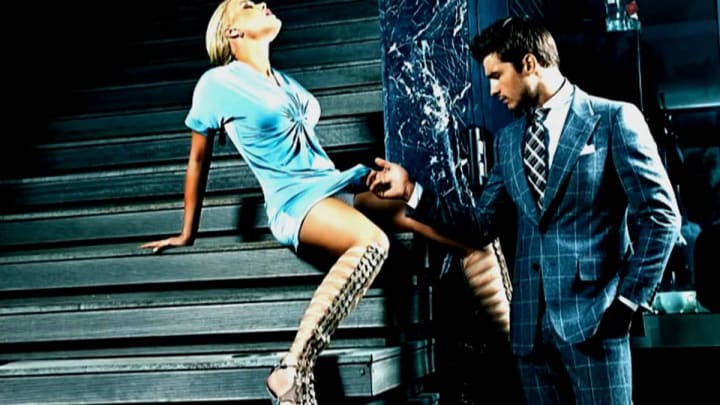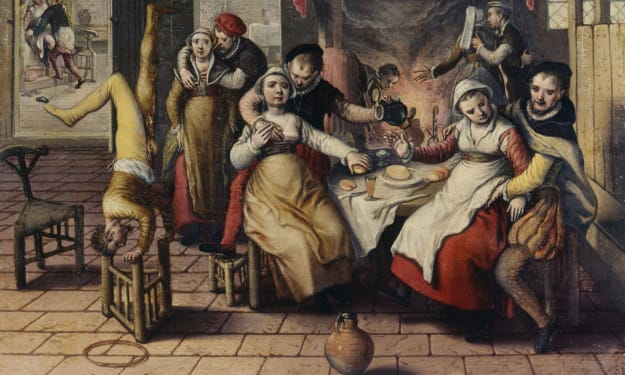Drugs, Sex & Money on Wall Street
Wall Street's underbelly, drugs, sex, and money were born out of the 1980s culture of decadence.

Too much money isn’t always a good thing. Back in the 1980s, Wall Street gave rise to a notorious New York City subculture whose principal goals were sex, drugs, and lots of money. That disconnect between material success and personal happiness was a byproduct of the opulent materialism of the decade. The 21st century ushered in an era of scrutiny and overt criticism of the decades of excess that led to a near collapse of the financial system starting in 2008. There is a feeling on modern Wall Street that you work harder for less money, and a lot less fun. When it comes to a cautionary tales of excess from the 1980s, most of us are inclined to refer to Martin Scorsese's Wolf of Wall Street starring Leonardo DiCaprio. The realities of Wall Street decadence are rarely aired in public. All too often, in a society of consumer pleasuring and narcissistic social media addicts, cautionary tales like that of Philip Hehmeyer, who was the subject of Peter McCabe’s article on sex, drugs, and money in the world of finance originally published in the February 1985 issue of Penthouse magazine, get a revisionist makeover by a society that admires Gordon Gekko and aspires to party like Jordan Belfort.

Photo via Wolf of Wall Street
A Hidden Wild Side
Philip L. Hehmeyer was a successful commodities trader and chairman of the New York Cotton Exchange. He lived well. He owned an antique Jaguar car, drank Dom Perignon champagne, loaned paintings to museums, and belonged to a country club on Long Island. He was thirty-seven and about to get married. His colleagues considered him an extremely quick and able man, a man at the top of his career. Nobody expected that one fall afternoon in 1982 he would go home to his Manhattan apartment, bolt the door, and blow himself apart with a shotgun. True, Hehmeyer had sustained some losses—nearly $60,000—but this wasn't considered excessive for a man who spent his days shouting bids to others in a trading ring. Earlier that same week, he had lost more than $60,000 in one day, but according to his younger brother, he had been able to cover most of it the next day. After his suicide, friends and family suggested that his losses might have contributed to a state of depression, but what could one make of the scrawled note he left: "Someone had to do it. Self-awareness is silly?"
The news of Philip Hehmeyer's death was greeted with a minute of silence on the floor of the Cotton Exchange. Then the opening bell rang and trading began. During the days that followed, friends and reporters continued to speculate about why he had killed himself. The pressures of the job, some suggested; the risks involved; the manic pace of the exchange floor. One friend remembered Hehmeyer standing one night screaming incoherently at the moon; The friend had seen him earlier that day maintaining perfect control in the trading ring. Several weeks later, I ran into a woman reporter, and in the course of our conversation the subject of Philip Hehmeyer came up. To my surprise, she said she had known him, albeit briefly. She had been returning from a trip to Memphis (where Hehmeyer was from), and as she stood at the taxi stand at La Guardia Airport, a man in his thirties suggested they share a taxi into Manhattan. The man was Philip Hehmeyer. "Within 10 minutes, as we rode in the taxi," she said, "we were snorting cocaine through $100 bills. His cocaine. His $100 bills." When I asked her for one word to describe Hehmeyer and her brief encounter with him, she said, "Wild."
Outwardly Conservative
The details of Philip Hehmeyer's lifestyle would appear to run counter to the conventional ideas about the Wall Street man—namely, that he is prudent, responsible, and conservative. If the Wall Street man ever was this way, events of the past two years have cast a few doubts about him. The Street has been riddled with insider trading scandals, one involving a columnist for The Wall Street Journal. Securities and Exchange Commission (SEC) charges have been brought against employees of major brokerage houses; Insider trading charges have been leveled against former deputy secretary of defense Paul Thayer; Marc Rich & Co., after being charged with fraud and tax evasion, has had to pay about $200 million in fines and back taxes. And the litany of "sins" doesn't begin and end with scandals or swindles. Earlier last year, The New York Times reported that the single biggest surprise associated with the city's new drug-counseling hot line has been the extent of its use by people working on Wall Street.
To the outsider, Wall Street might seem to be a bastion of conservatism. A former girlfriend of an options trader had this to say about her run with the bulls: "I told my mother I was dating this Wall Street guy. She was real pleased. She thought he’d gone to Harvard and wore striped ties. I never saw Tony wear a tie. What was my life like that summer? With him and his friends, it was a party that never ended. I mean, at twenty-seven, nobody should be making that kind of money. We’d go gambling in Atlantic City. We’d drop a couple of grand, stay up all night, fly to Westhampton next evening for a party. Tony would get fucked up on coke, then crash out on the lawn. I'm putting him to bed one night and his wallet falls out. He must have had at least $20,000 in cash in it. I mean him and his friends—their whole attitude to money is different. I guess the nearest thing to it is rock stars' attitudes. You can always make more, so why not spend it? It's the pressure of the job too; Everything has to be a blowout. So, it's sports cars, it’s dope, it's whores, it's parties. It has to be a crazy scene, or it’s no fun. These guys rented this fantastic Westhampton mansion. They installed a jukebox in the living room, had ounces of coke lying around. Nude volleyball at three in the morning; weird whores being chauffeured out from the city.”
"When I first met this guy he said, 'I'm going to turn you on to stuff that's going to change the color of your eyes.' He wasn’t kidding. Half these guys are whacked out and they’re only in their twenties. I mean, how long can you keep it up? These guys bet thousands, tens of thousands, every day. They're crapshooters. They never had it to start with, so what's the difference? Half of these traders are street kids—there's a whole lot of them on the Comex [Commodities Exchange]. The Brits are pretty crazy, too; There’s a lot of them. But they’re a bit more detached, out to take out what they can get. Course the older traders—they're not shooting for the moon every day. That’s why they’re still in there. They’ve seen the burnouts, the flip-outs. I mean, you talk about pressure—I was watching them one morning when the opening bell rang and it was like they'd all gone completely nuts.”

Photo via Perez Hilton
The Business of Money
"The world is not the way they tell you it is." Adam Smith wrote in The Money Game. "Wall Street teaches that money is very serious business. That the stewardship of capital is holy." Smith knew better. Wall Street threw a party in the 20s that came to an unseemly demise. Its next big bash in the 60s, given by all the go-go performance-fund managers, wasn't exactly a model of restraint either. But 40 years had passed since the crash, and the myth of respectability had taken shape in the meantime—a big PR victory for the Street. Smith let the air out of the balloon beautifully. He showed that the Wall Street man had blood in his veins and lust in his heart. The Street has changed a lot since the 60s, when Smith first wrote about it. Back then, volume grew, order pressure increased, the old firms couldn't compete. The old boy network at companies such as Lehman Brothers fell apart. The big houses gobbled up the old houses, and in came the "hungry boys from Brooklyn," as the new wave is often called. Markets have changed, too. The pressure on brokers to produce is tremendous—discount commissions have made the business that much more competitive. At several large houses, a broker who fails to generate a quarter of a million dollars in commissions each year finds that his share of the proceeds is cut.
But don't believe all the groans you hear. It’s nice work if you're trading for your own account in a wonderfully bullish or volatile market, and there have been a couple of these the past two years. Then it's dinner at Le Cirque or Lutece and late nights at Joanna's with high-stepping dates from the model world or if not, there are more than a few houses of ill repute in "Fun City" catering predominantly to the Wall Street crowd. And if you're out in Fire Island or the Hamptons and you run into a few fund managers and observe them in these habitats, come Monday you may want to put your money into rare postage stamps. In other words, if you spend any time on Wall Street after hours these days, or in such crucial locations as the men's room of a few offices just as a busy last hour of trading gets underway, you may think you're finding a new cult.
The Wall Street Man
But can this be the pinstripe man? Maybe not, but it’s certainly the Wall Street man of today. Dismiss for the moment those images in magazines like Esquire about Mr. and Ms. Clean-Living, Ambitious Hipster. Sure, there are plenty of them on Wall Street, but even they don't all manage to work 18-hour days on just adrenaline. There are, of course, among all the echelons on Wall Street, plenty of people who think of themselves as prudent and respectable and others who have been around long enough to witness the parade of casualties and aren't trying to outwit the market all the time or cheat bigger than everyone else. Then, too, there are all those bright young things flushed out by Harvard Business School, their heads full of corporate-analysis-IBM think, and they contribute to Wall Street's nice, solid image, too. But forget about them. They reside in the back offices, in analysis or corporate finance, and they're not stacking the chips every day and sweating out last night's coke bugs while they try to make a killing.
They are not the new high-fliers. They may love money and what it can buy, but not enough to stake everything for it. The people I'm talking about are more likely to have a high school education than a business degree. They are more likely to wear ties from Tie City than from Brooks Brothers. They are a motley young crew: crazed, desirous, raw, risk-takers, connivers, Johnny-come-late lies. For them the prizes are worth the risk; the prizes being cars, yachts, drugs, and women. Lust can make people crazy, and it makes a big part of Wall Street life inseparable from the prizes of the game. Wall Street doesn't like to admit it, but it has more than its share of wild dreamers and dream merchants. It has many secret lives. "The best way to think of Wall Street today," said a broker who has worked there 15 years. "is to picture the people who came to Gatsby's parties."

Photo via The Versatile Gent
Wall Street After Hours
One Thursday evening, I met with a Wall Street broker who had promised to show me a glimpse of Wall Street after hours. This man will be known as Ralph (not his real name—all the names of those interviewed for this article have been changed). We walk from his office to Harry's Bar at the American Stock Exchange. Outside the bar is a line of limousines, chauffeurs standing at the ready. "Anything you want in New York," Ralph said, "those guys in the limos outside Harry's can get you. You want to get whipped by a girl with green hair; Those guys can get you one." Harry's is a plush paneled place. Red and raffish. Ralph tells me it is the bar on Wall Street. There is another Harry's over in Hanover Square, but Ralph assures me this one is "where the action is." It is early evening and the place has filled up. The bar is predominantly male with a smattering of women. The men are looking pretty pleased with themselves—the bull has been loose, if not exactly stampeding.
"Thursday is usually a good night in here," Ralph says. "Friday, you cover your shorts. Thursday, you try to get inside someone's. It's a lot like hedging." Ralph laughs, then he goes off to talk to the men he knows at various tables "to see who's got clients with them, see who's lining up some action." I wait for him in the three-deep crowd at the bar. Some of the men I recognize from watching them earlier on the floors of the exchanges. They are now slinging down drinks, unwinding from the strain of the day. Voices are hoarse, collars loosened; Triumph gleams in some eyes. A group next to me is talking about sixteenths of points—points that can add up to thousands. Jokes are being traded along the bar—Wall Street humor known to move as quick as rumor.
"Hey. What’s the Polish National Bird?"
"What?"
"The fly."
"Hey, don't tell Freddie."
"Freddie ain't Polish."
"Hey, Freddie."
From down the bar: "Yeah. What!"
The joke is retold. Then the first man asks, "Hey. Freddie, you still short on Digital?"
"Yeah."
"Freddie, you're the only dumb Jew on Wall Street."
"Yeah? Monday, we'll see."
Ralph returns from various conferences. He's seen bull-market exuberance many times before. "Let's take a table." he suggests. Once we're seated. He tells me. "Okay, here's the poop. Those guys over there are headed off to a club...” He hesitates, “... a swingers club."
I wait for him to go on. Ralph is old guard Wall Street. His father worked in this business. Ralph was brought up to be rich. But his father surprised him by leaving all his money to the Wilderness Society. Ralph has never forgiven him. It isn't so bad, he explains, working as a stockbroker. But he's tired of it after 15 years. He has gained weight and is not in good health. "Have another," he declares. "I've got a better idea. We'll tag along with that crowd over there. They've got clients with 'em and I know where they're going." Ralph fills up the time telling me why he feels sorry for some of these young guys at the bar.
"They're too young to remember anything bad," he says. "They're making so much money, they think they're invincible." We leave Harry's on the heels of our quarry. They get into a limo. We take a cab. The clients with the Wall Street men are two bulky fellows who look like they might manage a Midwestern pension fund. This is their night on the town. As we ride uptown, Ralph has about him an air of the last honest man. He wants me to see for myself. He says, that "money and a stiff prick have no conscience."
We pull up at a bar in the East 40s. (It can remain nameless; there is no reason to ruin its trade.) Sure enough, the limo is already there and the Wall Street men and their clients are getting out. The clients' eyes pop when they get inside; If there were an admission charge for this bar, they would pay it. In a row at the bar and in another row of booths are a dozen or so of the best-looking hookers these guys (myself too, for that matter) have ever seen. The women's attentions perk up as the new crowd comes in.
Within a few minutes the women are mingling with the men. They are cozying up on the barstools and laughing at the same jokes they heard the night before, and the men are buying drinks and coughing up quarters for the jukebox. Sitting in a corner of the bar, Ralph volunteers that he could probably retire on what the bar must pay the cops each month to let it keep operating. We sit and watch the show. One of the girls is running her fingers down the sleeve of a man's suit. Eventually, she says. ''I'd like to sit here all night, but you know how it is.” Ralph whispers, "Five bucks they get it on." Along the bar there are a few nods and grins. One of the hosts—a portfolio manager, according to Ralph—gives a nod to the silver-haired bartender and hands over his credit card. "Dinner for two, Mr. Ford?" the bartender inquires. The client takes off with the lady. Ralph informs me that "dinner for two" used to cost $100. He says it costs more now. "Inflation, you know." The bartender returns the card and receipt to the manager. Ralph tells me I have just witnessed the most effective way he knows of to maintain good client relations.

Photo via DC Design House
Always the Best
If you spend any time on Wall Street, you come to realize that Wall Street always provides the best—the best tickets to whatever a client wishes to see, the best hookers, the best drugs. The cocaine you can buy through Wall Street connections, one trader told me, is phenomenally pure stuff, whether you're buying in volume or picking up a lunchtime gram in the Trinity Church courtyard. Of course, it should be. When you're making a six or seven figure income you can afford the best stuff. As one twenty-nine-year-old investment banker told The New York Times: "When you make half a million a year you can afford a cocaine lifestyle. After a deal you say, 'Let's celebrate, get a couple of suites in a hotel, girls from an escort service, a couple of limos, a case of Dom Perignon, and an ounce of cocaine.' It's just part of the good life." According to a number of sources, the traders are the heaviest users. Trading is a young man's game. It's where the fast money is, and cocaine is part of the lifestyle. "What else would you expect?" said one broker. "Cocaine is the drug that perfectly complements the profession." I met one commodities trader who admitted that his coke habit had skyrocketed during the last year. He used to snort as soon as the market closed. Now, he needs a toot to get to work. He insisted that job pressure was in part responsible for his need. For Jay Goltz, coke provided just part of the intensity he needed for work. Or so he said. I first met him in the Hamptons where he had rented a summer house with friends.
Mondays at 7:30 AM he would pull himself together, shake off the tremors, call his assistant at the office, and tell him: "Terry, if it opens down, sell chemicals. Don't matter. What? Yeah [impatiently], sell 'em. Sell DuPont. Whack the hell out of it." Then he would call a cab to take him to a seaplane, which would drop him off close to Wall Street, and he would be in his office shortly after 10:00. Jay was then a trader for one of Wall Street's leading institutions. He was a loner in his attitude to the market, never read a Baron's or a Journal. "Everything is in the price," he would tell me when I asked him about his market philosophy. He simply needed to be more right than wrong. He loved bear markets. "I'm a wizard short seller. Can't buy for shit. The world is coming to an end—that's when I'm at my best, when I believe that a few weeks before everyone else does." During our first meeting at his summer house, he and several trader friends were watching a Mets game and betting on every pitch. A series of coke lines lay on the coffee table in front of them. "Fifty, it's a ball!" Jay was yelling. "You wanna double? Seaver on the mound, man. You got a pitcher like Seaver and you won't double? What kind of chicken shit are you, Tommy?" He tossed down a couple of hundred-dollar bills. "Here, make it four to one."
That summer there were "coketails" every few hours or so, and games of croquet that got hopelessly out of control. There were bourbon "coketails" and tequila "coketails," and one evening back in New York there was a three-car bulldozing in the Yankee Stadium parking lot because Jay's car was boxed in. He paid off the drivers in cash and never asked for receipts. There were weekend coke junkets to Atlantic City, a bone fishing trip to the Bahamas to cool out. Some weekends he would turn up in the Hamptons, and his eyes would be puffy and his nose would run more than usual. "Bad week?" I would ask. "Could be worse. Down a few million. What the hell—it ain't my money." He decided to get out, and unlike many, at the top. "This is a kid's game," he told me. "I ain't a kid no more. I could go crazy if I stay in this." There was a party to celebrate his "retirement," and he brought the goodies; a couple of ounces of coke. He presented a margarita to someone with the glass rim rubbed with the world's most expensive salt substitute.
"Now, that's a coketail!" he roared. Jay took three-quarters of a million dollars away from the market. He went to live in the Florida Keys for a year. He caught a lot of tarpon and bonefish, and he spent a lot of money on boats. At the end of the year, he came back to New York. I went to see him. He was a partner in a small fund, and he was trading for it. He didn't mention if it was a "kid's game." I watched him trade for a while. He bought a few thousand shares of one company, and I asked what the company did. "Paradyne? I dunno. They could make paradynes for all I care—this baby's going up." Then I watched him lose $30,000 in 20 minutes. He had heard from another broker that another account had a big buy order for Kodak. It was true, but the order did not go in. It turned out they were going to hold it off until Monday. This was a Friday afternoon. In the meantime, Jay had bought in.
"This is what I do," he said. "Get in the middle with these guys and mix it." He was excited. Then the stock started to fall back: 72-3/4, 72-1/2, and 72. I was white. Jay was out of his seat, jabbing at the Quotron machine. The entire market was coming back. "What the fuck is going on here?" He grabbed the phone, finding time in the same breath to tell me that I'd brought him bad luck. "You told me you were sure!" he screamed at his informant. "You asshole, I just bought 40,000 shares." He was out of the stock within minutes. He kicked the trash can, thumped his desk, and then stormed out to the bathroom. A couple of snorts later he was back. "Shit," he said. "I was up $60,000 the past two days. Fuck, I hate to give it back."

Rules and Regulations
The New York Stock Exchange has a rule that a broker cannot give a client a gift worth more than $50. Brokers have long since found ways around this little regulation. Stories abound: One broker told me of phoning a scalper he knew in Boston, and getting tickets for a Bruins-Rangers playoff game. The client in this case did not care what he paid—the tickets were several hundred dollars apiece. Another broker rented a helicopter, filled it with clients, and landed it on the field at a Giants-Jets game. A bit more than $50. Ah, yes, but legally more safe than an expensive transistor radio. "Club 13 on Avenue A is closed now," one broker told me. "But in its day... " His eyes glaze over. "It was a whorehouse, and what a house. It was almost for brokers only. A dozen beautiful young things, naked at the door, and they would put on any show you asked for." The servicing of clients takes place at all levels on Wall Street. Remember, competition is fierce, especially now that commissions vary so widely, so if it costs a night on the town to keep a client happy, nobody thinks much about it. There is also a widespread feeling on Wall Street that if companies such as Lockheed can be in the business of buying friends, paying bribes abroad, then "we" know how to take care of clients, too.
By clients, I'm not talking about the small investor looking to find a secure haven for last year's hardware store profits. I'm talking about big money, in many cases foreign money, money in the pockets of those thieves to whom we pay too much for oil. Listen to Ed Jensen's account: Ed is an investment-portfolio manager for one of the big institutions on Wall Street. The man deals with clients all over the world, travels to the Middle East a lot, and knows a lot of Saudis. But he can't be expected to know all the important Saudis, so in his desk he keeps a list of the most influential ones—including the names of the royal family, of which there are about 600. One day he gets a call from a man who claims to be a Saudi prince. Indeed, the man is who he claims to be, and this man wants to have lunch with Ed because he has some money he wishes to invest. Our Saudi friend is trying to decide which Wall Street institution he should place his funds with.
Ed meets the man for lunch and finds his guest neatly attired in a three-piece business suit. Bear in mind now, our prince has to be discreet. He can't smoke a cigarette in public in his own country, or he might risk losing his hand, but he's been to New York before, and he has sampled some of the perks of decadent Western civilization, and he wants to try a few more. What he wants from Ed in return for a huge sum to invest is an apartment stuffed with cocaine, liquor, and girls who will walk around in their underwear and sit on his face. He wants some institution on a par with the Morgan Bank or the Oppenheimer Fund to provide him with these benefits, and to whomever does, he will dispense his largesse. A tough decision for Ed. Here he is, sitting across from this wealthy man who likes him, who thinks he is smart, and who is confident his money will be secure with Ed. And Ed is trying to decide what, if anything, he can do for this prospective gold mine of a client. All it will cost his firm is a few hundred in whores and a few thousand in drugs, both of which he can get his hands on in 30 minutes. Ed pauses in the middle of his story. "Well, did you do it?" I ask him. Ed has the look of a man who has passed up the opportunity of a lifetime. "I passed him along to a friend of mine who runs a hedge fund," he says calmly. "I told the prince that if he spent a little money that way, he could get all he wanted. He spent all of it that way."
The SEC is nobody's favorite institution. Its critics include law professors, Democratic congressmen, even its former officials. It operates on a tight budget. Its work force is small. It has conducted a widely publicized campaign lately against insider trading, but these cases are hard to prove. No less importantly, insider trading is hard to define, as a congressional committee discovered. "This SEC made itself the national nanny," a New York law professor, John J. Slain, told The New York Times. "It has put itself into a false position of trying to get investors perfect information. Which is impossible." Slain added, "What they typically do is find some poor schlunk who has been indicted about tour times and has run out of money for lawyers, and use him to try out some new theory of law." Brokers are no less kind. "The SEC is famous for shutting the stable door once the horse has bolted, " one said. The fact is that the SEC has a tough time of it. Wall Street is a wonderful world of opportunity, and it has lured to its bosom a rather wild and wonderful bunch. Wonderful in their raw optimism, and in their eagerness to grab the pot of gold. It takes nerves of steel to listen each day for the first hint that the orchestra will stop playing; and it the music does end, there will be a big price to pay. So, the corners get cut, a few lies are told, the rules get bent, or broken. Why not? After all, nothing much happens to the guys at the top. But the SEC even has a tough time proving cases against the small fry. Its targets often outsmart it. Some of the less scrupulous fund operators the commission has pursued are men who have paid their dues, have worked their way up, and know the ropes.

Photo via 4ever
Stories Worth Telling
Take the case of Jamie. His story was told to me by two brokers Ralph, my guide from earlier on, and somebody named Vic. Jamie had gone to a good school out west. He took a small nut of $25,000 and ran it up to a few hundred thousand in a year. He did a few risky things, and one day he outsmarted himself and the SEC came after him. "Now Jamie was a flake," Vic said. "He kept his account in a shoebox and had two dishy Icelandic women working for him, but he wasn't dumb. He appealed the case and won."
"The only thing was," Ralph said. “Jamie wasn't around for the decision. He was in jail in Afghanistan on spy charges." Before long, both brokers were engrossed in telling their stories.
"Remember Crazy Mel?"
"Sure I remember him," Vic chuckled.
Ralph explained that Mel, a legend on the Street, had turned a few hundred thousand dollars into a $40 million hedge fund, and then blew it. All of it. "Some went to dope," Vic said. "some into movies anyway, it was all invested unwisely."
“At some point, when all the creditors were after him, he claimed he'd suffered a heart attack," Ralph went on. "I heard the story from a woman who was dating him. She called a hospital he'd been admitted to, and the nurse in charge told her. 'I'm sorry, miss. Mr. Geller has expired.' " Six weeks after I heard this story, Vic called me with an update. Mel Geller, it turned out, was alive after all.
One day I went down to Wall and Broad and talked to a few clerks hanging around outside the exchange. We talked about futures—theirs. "You get to see all sides of the business," one of them said. He was all of 19 and had tinted his hair Day-Glo orange. "It might seem like we're doing nothing, but we're learning."
"You can learn it so quick," another said.
"Options are the name of the game. Get your client into options."
"Bigger commissions?" I suggested.
"Sure, and you can trade against the order."
"Is that kosher?"
"Everybody does it."
"Do you have an account now?" I asked another clerk.
"Nah—too busy running bets."
"Bets?"
"You can place a bet on the exchange floor quicker than you can get off an order."
"We're getting into this business at the right time," the first clerk said.
"The 80s will see a big jump in the Dow. Volume will be bigger than ever. Look at the last few years. A hundred million shares day is normal now." Truth shone in his eyes.
"So you think you'll be rich?"
"I got a good shot at it."
“All sorts of new indices are opening up," said the second kid.
"Stock-futures indices—big area."
"Risky?"
"But you can make a killing."
"It really is the ethos of this country that you ought to be rich," a broker I met in the course of researching this story told me one evening. "You get reminded of this all the time, everywhere, but it's even worse if you work on Wall Street. It becomes the goal, the only goal. At the end of the day you add up the score. That's all that counts."
"I find it worse when things are prosperous. People say that only tear and greed move the market, but that's a tired cliché. There's the feeling of not wanting to miss out—that isn't necessarily the same thing as greed. It's the feeling that if everyone else can afford vacations. Expensive meals, beautiful women, why not you, too? I think it's a kind of peer pressure.”
"Then there's the game itself, wanting to be right. When I first came to work on the Street, I was excited, just as excited about being right as about making money. It's fun for a few years. Maybe you make some money, you buy things you could not afford to buy at one time, but things you take for granted after a while. Being right is what keeps you up for it–and that's why some guys fall apart. They have to be right."
Our broker paused and stared at the paintings on his living room wall. "There's an old Wall Street story," he said. "It says it all. A guy who has made a lot of money has fallen on hard times. He's been losing heavily. He has a beautiful mistress, and one evening he tells her about his predicament. 'Will you still love me if I lose it all?' he asks her. 'Oh, honey, I'll still love you,' she says, 'but I'll miss you.' "
About the Creator
Filthy Staff
A group of inappropriate, unconventional & disruptive professionals. Some are women, some are men, some are straight, some are gay. All are Filthy.






Comments
There are no comments for this story
Be the first to respond and start the conversation.